By Erica Friedman
Alison Wilgus has had an amazing year with the release of her book Chronin, Volume 2: The Sword in Your Hand, out right now from Tor Books. The Beat caught up with Wilgus at Fashion Institute of Technology’s Diversity Comic Con to talk about the culmination of this decade long epic.
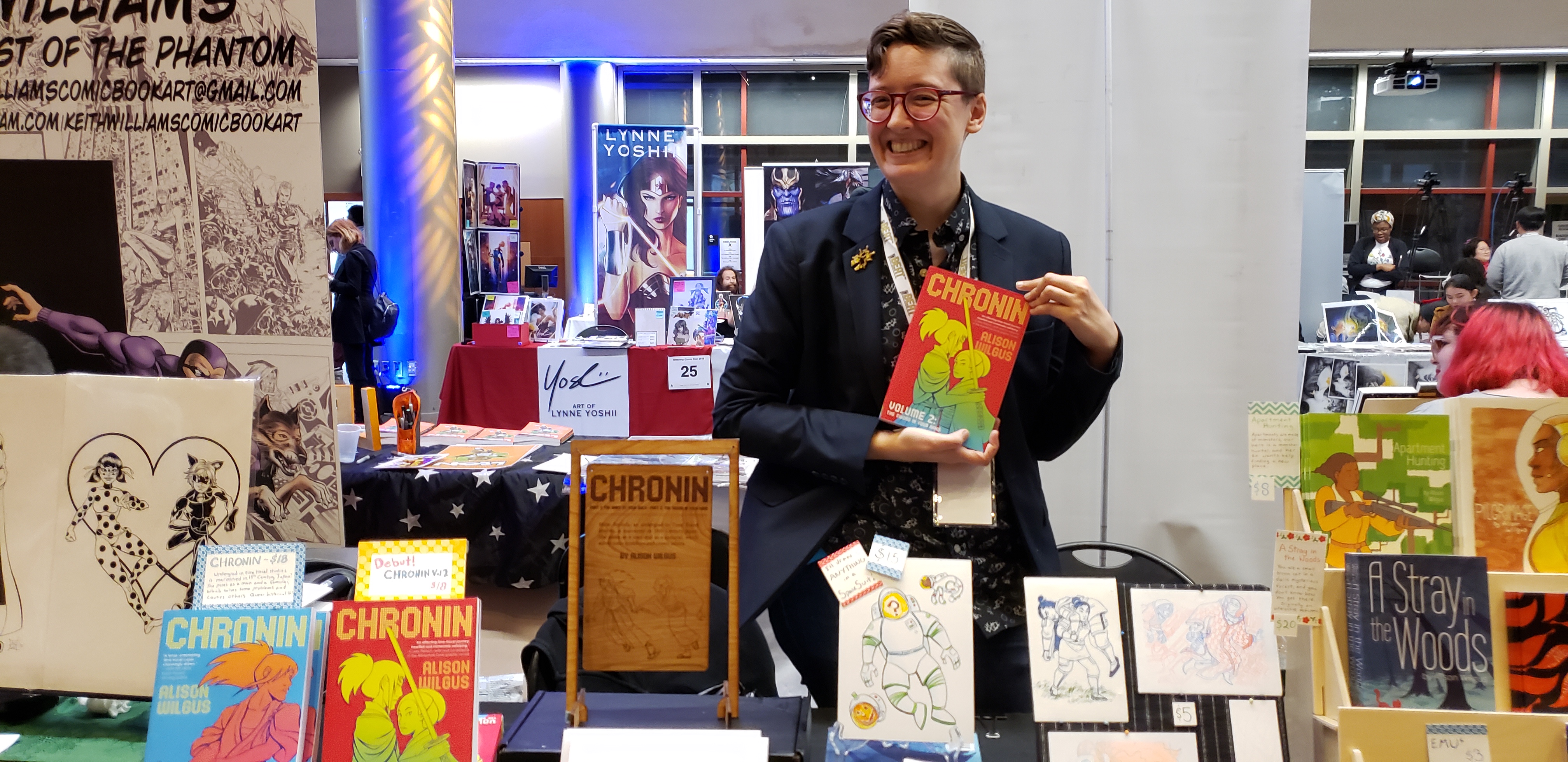
ERICA FRIEDMAN: You’ve been crazy busy recently. How many shows have you done this year?
ALISON WILGUS: I don’t remember; somewhere between 12 and 14, I think. I didn’t exhibit at all those, but everything I went to, I was on at least one panel… so, it been a lot. It’s been a big year, so I’m happy.
FRIEDMAN: So let’s talk about your big year. Let’s start from the beginning. I remember years ago, we were walking back from New York Comic Con and you started talking about this idea.
WILGUS: God, yeah.
FRIEDMAN: Tell us about the genesis of this idea.
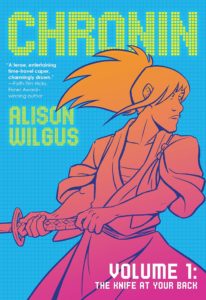
WILGUS: Basically, I was in my early 20s, I was working on a Cartoon Network Show called Kids Next Door, and I had graduated from school studying animation, I had done some comics, and basically I was having the feeling of, “I love working in animation and everything, but I’m spending all my time working on this thing that isn’t mine…and I should probably come up for a project for myself, so I have something I’m doing in my free time that isn’t just goofing around on the Internet.” I was drawing fan art and that kind of thing, but I wasn’t making a thing of my own. I’d been doing a lot of sketches of a character that eventually became Mirai [from Chronin], where I was like, “What if you have a character who … is wearing this mix of modern and historical clothing?”
Then I was thinking, “Well maybe this would be about time travel, because I’ve always loved time travel stories.” It was so many years ago at this point; I was 25 then and I’m 38 now. Basically, I took all the things I was into at that time: I had just finished being really obsessed with Rurouni Kenshin [manga written and illustrated by Nobuhiro Watsuki, 30 volumes available from Viz Media]. I was on the tail end of that, which involved reading a lot about that period of history: the Meiji Restoration and the Bakamatsu, the late Tokugawa, that whole chunk. I had my life forever changed by the movie Mulan as a teenager — I’d seen it at that point probably 15 times — and I do love time travel stories, like the classic Back to the Future stories. [They’re] fun and relatively straightforward about the time travel, but mostly the time travel is a mechanism to let you do fun stuff sort of stories. Then [I] put those all in kind of a pot, then percolate it for a while. And actually, the thing that got me to sit down and really start thinking about this in earnest, of all things, was the Rising Stars of Manga competition that Tokyopop was running back in the day.
Me and my friend Erin Finnegan sort of switched off; we did two years in a row where we both collaborated making short comics, and one year we did her idea and one year we did my idea. That comic is terrible. The Chronin comic I did was terrible. (Laughs) Kuji, Mirai and Hatsu are all in it, the basic love triangle-ness of it — it used to be much more of a love triangle story. Kuji was the villain in a much more explicit kind of way. The ingredients were all there, but it was very stupid. (Laughs) And trying much harder to be, like, a manga in a way that I’m not doing any more.
Then I just sort of sat down and started working on this thing and wrote the script for it. It went through multiple rounds of revisions and after… honestly, I can’t explain why I decided that I was going to keep picking away at this project for years.
FRIEDMAN: It just spoke to you?
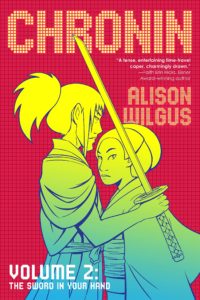
WILGUS: I’m just kind of like that. Either I don’t do it at all, or I pick away at it over time and eventually will finish it. One of the big transitions for Chronin was that with Volume 1, I kind of worked at my own pace. I originally was going to do it with a different, small publisher that doesn’t really exist anymore; they didn’t really give me a deadline or anything, so I just kind of worked when I had time. They didn’t give me any advance; I just did it when I could. When I sold Chronin to Tor, the first volume was basically done, and the second volume was basically a script.
FRIEDMAN: But then you had a deadline.
WILGUS: But now all of a sudden I had a deadline. The first volume I did, on and off, for eight to 10 years, second volume I did in two and half years. People who have not seen this, I want to stress: it’s 150 pages longer that Volume 1. I did it in, like, a fraction of the time, and it’s much bigger.
FRIEDMAN: Your work matured a lot over that time.
WILGUS: Yeah. In Volume 1, I redrew some early stuff and fixed it, but I didn’t want to be one of those people who spend months and months redrawing old artwork. I have to move forward. It’s a huge book and by the time I finished redrawing it, I wouldn’t like it anymore anyway. The most important thing is, I hired an inker, Niki Smith (Crossplay, The Deep & Dark Blue), who is an amazing artist in her own right. She inked most of Volume 2, and I would not have been able to do it. I probably would have died, like I would have thrown my computer out the window and run away. I hate inking, it turns out. Some people find it soothing, but I get bored too fast, especially something that big. Especially having to do it all day, every day.
FRIEDMAN: Let’s start with Mirai, your protagonist. To me, she sounds the most like you.
WILGUS: It turned out that way. It’s really interesting…I wouldn’t have thought…at the time, in my 20s, if you had asked me, “Oh, is Mirai like you?” I’d would have said, yeah, because she’s kind of nerdy and can be a little…I probably would have said “tomboy,” at the time, which is hilarious, in retrospect.
FRIEDMAN: Even though she’s crossdressing [in the story], she’s really not particularly tomboyish at all.
WILGUS: No, she’s a genderqueer character, right? She doesn’t — I’ve had some people describe her as non-binary, which is not how she’d describe herself, but it’s fair. This is set in the future, so I feel like part of it is that maybe gender just isn’t that much of a thing; she’s just doing the thing she’s doing.
In retrospect, Mirai is more of me than I thought at the time. I just thought, “Oh, she’s just kind of a nerd and joined a time travel program because of being a nerd, for nerd reasons, and that’s the most relatable part.” Looking back, I’m like, “Oh, and she also dated this guy she shouldn’t have been dating for who knows what reasons, and in retrospect, that wasn’t a super good idea!” Her queerness is not something that’s discussed a lot, like, she’s not having conversations with people about how she identifies; she’s just sort of doing the thing she’s doing. The ways I relate to her are more like on the backend. How I constructed her story, and how she moves through her life, reflects a lot of how, ultimately, I ended up moving through my life.
FRIEDMAN: So, maybe she was breaking that ground for you?
WILGUS: She’s very much a processing character. I make jokes a lot about [how] all fiction is therapy… It takes so long to make a thing. You have 10 ideas; you have to decide which thing you’re going to spend time on. What is interesting to me, to [want to] spend all this time on it? And in comics, even more so. Like, what am I going to spend years and years doing that’s still interesting to me? A lot of the time, it’s because there’s something in there that you’re working through.
FRIEDMAN: Let’s talk about Kuji, Mirai’s ex-boyfriend.
WILGUS: I love Kuji, because he’s definitely a dick. All of the characters are kind of dicks in Chronin, but Kuji, in particular — I just really like to spend a lot of time thinking about him. I’ve had people in my life who were jerks, and the thing is they all think they are the victim. Certainly they all think they are the hero of their own story, right? So it was really important to me that what Kuji did would make its own sense. And you could see how he was sort of trying… He does figure some shit out through the course of the book, and what I wanted was for him to be faced with the fact that things he’s doing have consequences. Ultimately — and this wasn’t in the early drafts of the script — Hatsu and Kuji is one of my favorite relationships.
There’s two things that I didn’t originally plan that I love: Hatsu was the one who called him out, like you can’t just do things, they have consequences. I love that she puts together the pieces. I love that Gilbert — although he ultimately is a complicated character — one of the things I really love is that he thinks Mirai is amazing. He’s the one who is like, “Dude, what the fuck is wrong with you? I understand that you two have things you don’t agree about, but your weird dismissiveness of her is insane. She’s amazing.”
Hatsu and Gilbert both think Mirai is great for different reasons and want to take Kuji by the shoulders and be like, “You should definitely not date, that was a correct decision, but you have to stop being an asshole about this.”
FRIEDMAN: Let’s talk about Hatsu. She’s the voice of reason.
WILGUS: I love her so much.
FRIEDMAN: I love her so much. How did you come up with Hatsu?
WILGUS: It’s so interesting. In original drafts of the books, she was a very one-note character, which often happens with things like this. What was really great was that as I was actually writing the book and fleshing it out, she sort of evolved into filling in all of the open space, if that makes sense. So, if there was a need for character to do something, she usually ended being the person to do it.
FRIEDMAN: She’s always the character who says something. It’s fascinating to me to have a character in her position just coming out and saying things that need to be said.
WILGUS: I realized that, fundamentally, the thing that’s going on with her is that she’s been through a lot of shit. She’s just a very practical person, because at the end of the day, she sort of has to be. So what ends up happening — whenever there’s something unsaid, or people are being ridiculous about something — she’s like, “We’re wasting our time.” But then again, she’s spent a lot of time being very careful and kind of politic. She [eventually] finds a place where she can be an unfiltered version of herself, which I think is just nice for her. I wanted it to make [her arc] make sense. Everyone in Chronin is somebody who is a little bit of a weirdo, isn’t completely fitting in the situation they are in at the beginning of the book, so I wanted her to be chafing at the edges. She’s fine, she’s not a victim, she’s go her shit together, more than anyone else.
FRIEDMAN: Out of necessity, perhaps, but…
WILGUS: Yes, and having her being able to see — by dealing with these people — alternative ways of doing things, [she] kind of grow[s] into that role without really thinking about it. By the end, she’s like, “Oh yeah, this makes sense.”
FRIEDMAN: In most time travels stories, there’s always that character [from the past] that has that crisis of identity, but she doesn’t do that. Everyone else does, not her.
WILGUS: She knows exactly who she is. Her impatience is with people who aren’t interested in that, or the constraints of her situation. But Hatsu knows who she is and when a bump in the road comes up, she’s like, “OK, what are we going to do about it?” All of her problems have to do with the situation she’s in and having to make choices about what she’s going to put up with and what she won’t. Weirdly, she could never be the protagonist of the story because her shit is too together. You need a protagonist who is a bit of a mess and needs a bigger journey.
It’s been so nice for me, because when you put a book out in the world, it’s totally out of your control how people are going to react to things. It’s been really nice to see how much people liked [Hatsu] specifically. I expected people to like the asshole characters, and some do, of course.
FRIEDMAN: But no one in the book is just an asshole. They always have a reason.
WILGUS: I wanted everyone to have a point, in some way. Even if they are wrong. It’s easy for us with 20/20 hindsight to look back on history and be like, “Oh, well, clearly this was the thing to do…” I really wanted to get across [that] the Ishin Shishi (the pro-Emperor activists of the Meiji Restoration) were idiots. Most of them were like crazy teenagers, running around murdering people.
FRIEDMAN: I love the way you put history back, and the description of how it worked. How they explained how you can’t just [do that].
WILGUS: I feel like it disrespects how big a lot of these movements are. All of the pieces are still there; you broke it a bit too much. I like the idea that this was such a big cultural, political movement, that [the villain] was never going to be able to derail it entirely. That’s why I’m really glad I went with the parallel world model of time travel — it just gives you a lot more room.
FRIEDMAN: What’s one thing you learned while working on Chronin?
WILGUS: So, I definitely learned that I was gay. (Laughs) Literally while I was making this comic, in a way that was very funny. I learned that I could do this. I learned that I probably won’t do it again, which I think is valuable. It’s valuable to me to know I can make this 730-however-long-it-is-page giant comic and I made most of it by myself, then I had Niki helping me, which is huge. I’m really glad I know I can do that, but I’m also really glad I don’t have to do it again.
I think I learned about — this sounds bad — but I learned how trapped I was in the decisions I had made so long ago. It made me think about why did I even do that. Going forward on other projects, I’m going to be more thoughtful, because I had to spend so much time really living with old decisions of mine, many of which were not examined at the time at all. It made me self-aware in a way that I would not have otherwise been.
And I learned a ton about this period of history. I came in knowing a medium amount, and I did a lot of research — and, of course, I have forgotten as much as I’ve learned, which is annoying. I’ve been working on this for over ten years; you just can’t retain all of it.
FRIEDMAN: One more question. What’s next?
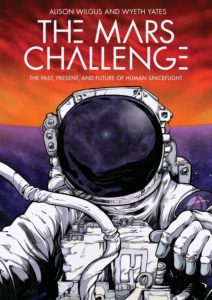
WILGUS: Immediately next, I have a non-fiction book about space that’s coming out from First Second Books in June called The Mars Challenge (available June 2020), which is obviously very different, but I’m still really excited about it. It’s drawn by Wyeth Yates, who is really great. And right now, I’m pitching some books around, so I’ll have at least one thing coming out in the next couple of years. I’m writing prose novels again, which has been really fun; [I’m] trying to do more short comics. I think I underestimated how burnt out I got working on Chronin, and then going to 8 million conventions, so I was going to try to have a new short done for MICE…and I did not have it. Now I’m aiming for the spring.
I’m going to keep drawing my short comics; I’m going to try and write graphic novels with other people; I’m going to keep doing science fiction stories; I’m going to keep doing queer stories; I’m going to be doing more stuff for younger readers, in addition to stuff for adults. My brand is going to continue to be a mess.
And I’m an idiot because I’ve determined to do NaNoWriMo this year, because I have an outline, I got a first chapter, so I have some momentum going. I’m going to finally write the lesbian podcast wizard story that I was sitting on last year.
FRIEDMAN: And I want to read it. I look forward to it.
WILGUS: Yeah, it’s ridiculous. They are wizards who make podcasts, and they’re lesbians.
FRIEDMAN: Sounds like…my life. I live that. (Laughs) That sounds fantastic. Thank you so much for your time!
WILGUS: Thank you for talking with me!
Chronin, Volume 1: The Knife At Your Back and Chronin, Volume 2: The Sword In Your Hand are both available wherever books are sold, as well as online through Tor Books. To keep up with Alison Wilgus on social media, follow along on Twitter @aliwilgus.


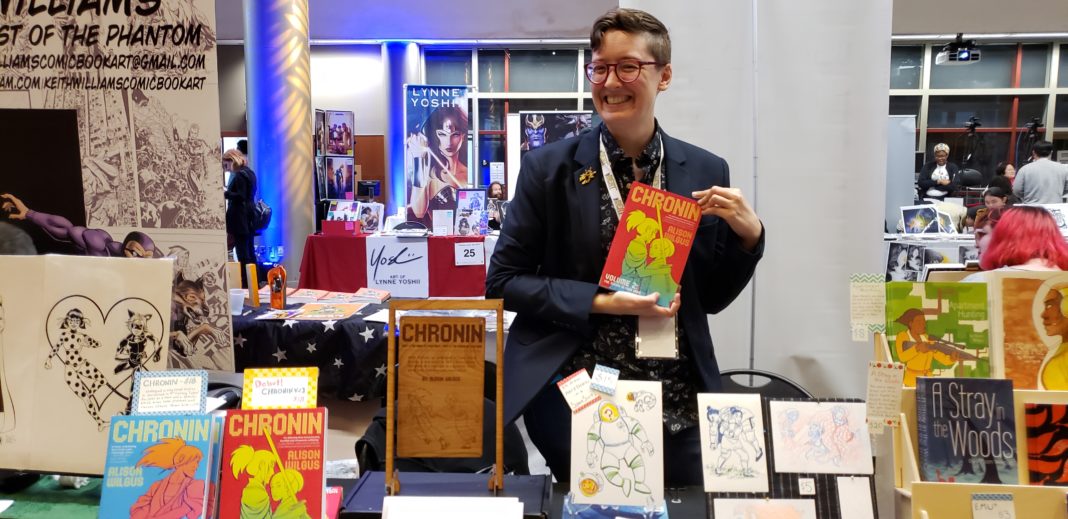

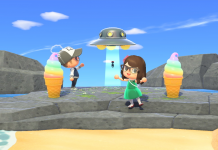
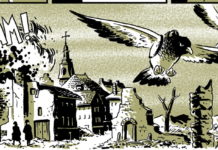
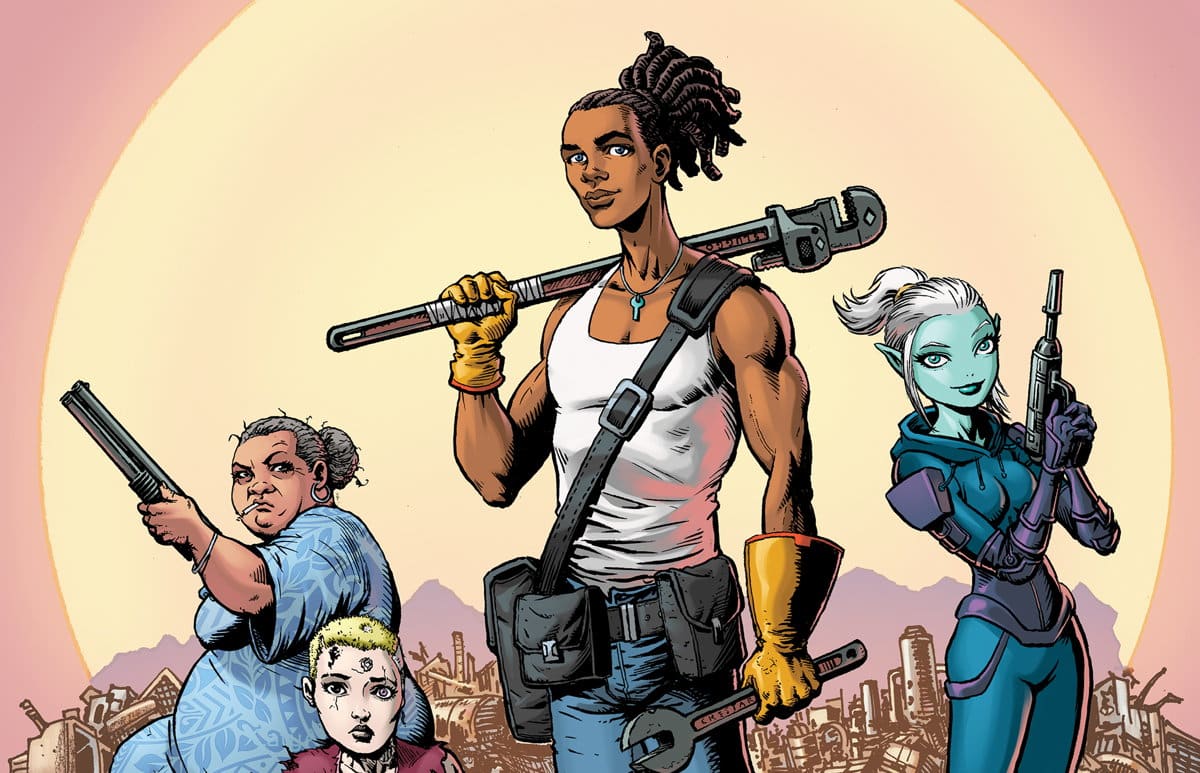


great interview. thanks!
Comments are closed.